You may have already noticed the subject of oxalates (or oxalic acid) crop up if you’re somebody who follows healthy eating advice and, like me, loves their veggies!
Oxalates are organic acids naturally found in and made by plants, animals and even humans. Oxalates are always in our bodies, with our cells consistently converting other substances like vitamin C into oxalates. Aside from our bodies making them, a range of healthy food contain oxalates, with plant’s leaves generally higher in them than their stalks, stems and roots. The most common sources of oxalates in foods include spinach, Swiss chard, beetroot, okra, parsley, celery, green beans, berries, kiwi, grapes, quinoa, almonds, cashews and soy beans.

Some research shows that oxalates can bind in certain plants and prevent calcium absorption or possibly cause kidney stones. However this remains a controversial area in clinical nutrition. The majority of kidney stones in adults in the West are calcium oxalate stones. But the research hasn’t made it clear whether restricting dietary oxalates helps prevent them in those that have previously suffered from kidney stones. Indeed, many scientists are convinced that avoiding dietary sources of oxalates can’t make a big enough difference to stone formation. Recent studies have also shown us that protein and calcium intake also affect kidney stone formation as much as or even more than oxalate consumption.
People who have previously suffered from kidney stones are best advised to limit oxalate intake.
But for the rest of us, foods containing oxalates should not be a health worry as these foods provide a multitude of health benefits. Cooking doesn’t have much of an impact on the content of oxalates in food, with studies showing very little lowering in oxalates when leafy green vegetables are boiled or blanched. The maximum reduction is generally about 5-15% when cooking foods high in oxalates. Plus cooking foods like vegetables can denature their fragile enzymes and cause a loss of vitamins more quickly than then their oxalates are lowered.
If your digestion and ability to metabolise fat are operating as normal, then oxalates from food don’t generally accumulate in your body.
Oxalates ultimately remain a controversial topic and the best we can do is continue to eat a wide range of different leafy greens, vegetables, fruit, nuts and legumes.

